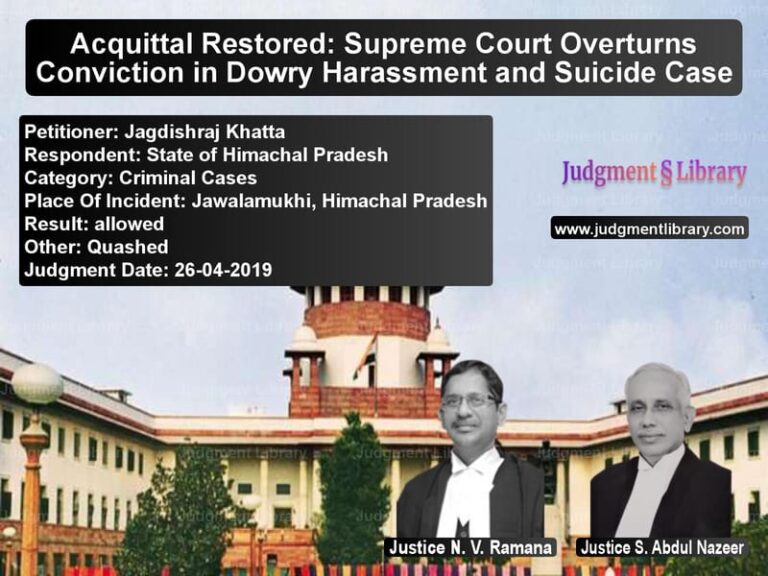Constitutional Validity of Insolvency and Bankruptcy Code: Supreme Court’s Verdict
The Supreme Court of India delivered a landmark judgment in the case of Swiss Ribbons Pvt. Ltd. & Anr. vs. Union of India & Ors., addressing the constitutional validity of key provisions of the Insolvency and Bankruptcy Code, 2016 (IBC). This judgment, authored by R.F. Nariman, upheld the framework of the IBC and dismissed the petition challenging its provisions.
The Insolvency and Bankruptcy Code (IBC) was enacted to streamline insolvency proceedings and enhance the ease of doing business in India. However, several petitions were filed challenging its provisions on the grounds of being arbitrary, discriminatory, and violative of fundamental rights.
Background of the Case
The IBC, implemented in 2016, aimed to consolidate insolvency laws and provide an efficient mechanism for resolving corporate insolvencies. The petitioners, Swiss Ribbons Pvt. Ltd. & Anr., challenged the provisions of the IBC, particularly the differentiation between financial creditors and operational creditors.
The key concerns raised were:
- The appointment process for the National Company Law Tribunal (NCLT) and the National Company Law Appellate Tribunal (NCLAT) was allegedly contrary to judicial standards.
- The distinction between financial and operational creditors lacked a rational basis, violating Article 14 of the Constitution.
- The powers granted to resolution professionals and committee of creditors were excessive and arbitrary.
Key Arguments by the Petitioners
The petitioners argued that:
- The differentiation between financial and operational creditors was arbitrary and unconstitutional.
- The IBC granted disproportionate power to financial creditors, marginalizing operational creditors in decision-making.
- The appointment process of NCLT and NCLAT members violated previous Supreme Court rulings in the Madras Bar Association case.
- The classification of creditors resulted in unequal treatment, as financial creditors had a decisive role in the resolution process, while operational creditors had limited influence.
Response by the Union of India
The Union of India, defending the IBC, stated that:
- The classification between financial and operational creditors was based on sound economic rationale.
- Financial creditors, such as banks and financial institutions, had better expertise in evaluating business viability, justifying their greater role in the resolution process.
- The NCLT and NCLAT appointments were made per the Supreme Court’s directions and complied with all legal provisions.
- The IBC aimed to promote economic revival while balancing the rights of all stakeholders.
Supreme Court’s Ruling
The Supreme Court ruled that:
- The classification between financial and operational creditors was neither discriminatory nor arbitrary. It was based on rational criteria considering the role of financial creditors in corporate restructuring.
- The committee of creditors was within its rights to make commercial decisions, and the judiciary should not interfere with the commercial wisdom of the creditors.
- The appointment of members to NCLT and NCLAT was legally valid, and no procedural irregularities were found.
- The IBC was a significant economic reform and had successfully addressed the issue of corporate insolvency.
The Court stated:
“The differentiation between financial and operational creditors is justified. Financial creditors are in a better position to assess viability and propose effective restructuring plans.”
It further observed:
“The provisions of the IBC are neither arbitrary nor unconstitutional. They serve the objective of maximizing asset value while ensuring a time-bound resolution process.”
Impact of the Judgment
The ruling reinforced the legitimacy of the IBC, ensuring that the resolution process remains efficient and fair. It strengthened the role of financial creditors and reaffirmed the judiciary’s commitment to upholding economic reforms.
Conclusion
The Supreme Court’s verdict played a crucial role in upholding the constitutional validity of the IBC. By balancing commercial efficiency with creditor rights, the judgment paved the way for a robust insolvency resolution framework in India.
Petitioner Name: Swiss Ribbons Pvt. Ltd. & Anr..Respondent Name: Union of India & Ors..Judgment By: Justice R.F. Nariman.Place Of Incident: India.Judgment Date: 25-01-2019.
Don’t miss out on the full details! Download the complete judgment in PDF format below and gain valuable insights instantly!
Download Judgment: Swiss Ribbons Pvt. L vs Union of India & Ors Supreme Court of India Judgment Dated 25-01-2019.pdf
Direct Downlaod Judgment: Direct downlaod this Judgment
See all petitions in Company Law
See all petitions in Corporate Governance
See all petitions in Bankruptcy and Insolvency
See all petitions in Judgment by Rohinton Fali Nariman
See all petitions in dismissed
See all petitions in supreme court of India judgments January 2019
See all petitions in 2019 judgments
See all posts in Corporate and Commercial Cases Category
See all allowed petitions in Corporate and Commercial Cases Category
See all Dismissed petitions in Corporate and Commercial Cases Category
See all partially allowed petitions in Corporate and Commercial Cases Category







